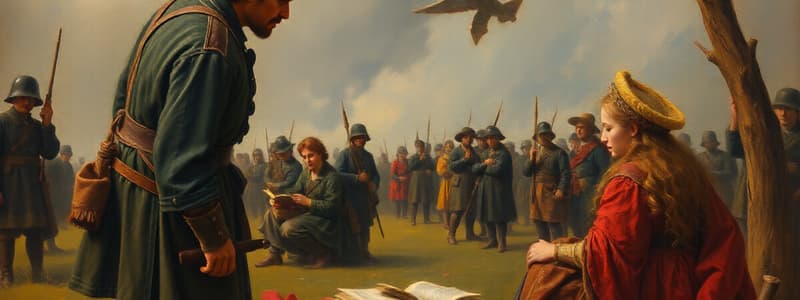Podcast
Questions and Answers
Considering the sociopolitical context implied in the excerpt, which of the following micro-level interactional strategies do Annemarie and Ellen primarily employ to navigate their encounter with the soldiers, and what is the most likely underlying rationale?
Considering the sociopolitical context implied in the excerpt, which of the following micro-level interactional strategies do Annemarie and Ellen primarily employ to navigate their encounter with the soldiers, and what is the most likely underlying rationale?
- Strategic ambiguity and calculated misdirection in their verbal responses, designed to confuse the soldiers and create opportunities for escape or resistance.
- Overt defiance coupled with demonstrative assertions of national identity, aimed at subtly subverting the soldiers' authority and bolstering their own sense of agency.
- Subtle impression management through carefully calibrated verbal responses and avoidance of direct eye contact, predicated on the understanding that minimizing perceived threat reduces the likelihood of escalating scrutiny. (correct)
- Tactical compliance combined with non-verbal communication cues indicating discomfort, intended to minimize immediate risk while signaling their disapproval to potential bystanders.
Given the soldiers' directive to 'Go study your schoolbooks,' and considering the historical setting of the narrative, what latent ideological function might this seemingly benign instruction serve within the broader framework of state control and power dynamics?
Given the soldiers' directive to 'Go study your schoolbooks,' and considering the historical setting of the narrative, what latent ideological function might this seemingly benign instruction serve within the broader framework of state control and power dynamics?
- Promoting intellectual curiosity and critical thinking among the younger generation to foster a more enlightened citizenry capable of questioning state authority.
- Channeling youthful energy and attention toward sanctioned educational activities, thereby diverting it away from potential dissident behavior or subversive political engagement. (correct)
- Facilitating the dissemination of counter-propaganda and alternative narratives within the school system, aimed at undermining the regime's ideological hegemony.
- Cultivating a sense of intellectual superiority among the youth, thereby creating a social hierarchy that legitimizes the existing power structure and discourages egalitarian movements.
Assess the strategic implications of the narrative's assertion that soldiers were becoming 'a normal and unimportant part of life.' How does this normalization, within the context of the occupation, subtly impact the psychological resilience and potential resistance efforts of the civilian population?
Assess the strategic implications of the narrative's assertion that soldiers were becoming 'a normal and unimportant part of life.' How does this normalization, within the context of the occupation, subtly impact the psychological resilience and potential resistance efforts of the civilian population?
- Enhanced psychological resilience and strengthened social cohesion, as the civilian population develops coping mechanisms and mutual support systems to withstand the pressures of the occupation.
- Diminished perception of risk and gradual acceptance of the occupation as a permanent reality, resulting in decreased motivation for resistance and increased susceptibility to propaganda. (correct)
- Increased vigilance and heightened sensitivity to potential threats, leading to more effective mobilization of resistance networks and proactive countermeasures against the occupying forces.
- Erosion of collective identity and shared values, replaced by a pragmatic focus on individual survival and opportunistic collaboration with the occupying forces for personal gain.
Given the subtle power dynamics at play, what is the most critical semiotic function of the soldier's seemingly innocuous comment, 'Better than me', made in reference to Ellen's academic abilities, and how does this veiled statement contribute to the overall atmosphere of tension and uncertainty?
Given the subtle power dynamics at play, what is the most critical semiotic function of the soldier's seemingly innocuous comment, 'Better than me', made in reference to Ellen's academic abilities, and how does this veiled statement contribute to the overall atmosphere of tension and uncertainty?
Considering the narrative's emphasis on the characters' actions to 'avoid eye contact with soldiers to avoid attention' and hurry home, what deeper sociological principle relating to stigma management and social interaction is being illustrated within the context of an oppressive regime?
Considering the narrative's emphasis on the characters' actions to 'avoid eye contact with soldiers to avoid attention' and hurry home, what deeper sociological principle relating to stigma management and social interaction is being illustrated within the context of an oppressive regime?
Flashcards
Annemarie Johansen
Annemarie Johansen
The main character who is interacting with soldiers.
Ellen
Ellen
Annemarie's close friend, described as pale and wide-eyed.
Kirsti
Kirsti
Annemarie's younger sister, initially stubborn.
Soldiers' presence
Soldiers' presence
Signup and view all the flashcards
Avoiding eye contact
Avoiding eye contact
Signup and view all the flashcards
Study Notes
Character Interactions
- Annemarie Johansen encounters soldiers, she is polite, but notices Ellen is scared
- Annemarie looks after Ellen and Kirsti
- Soldiers ask Annemarie about Ellen
- Kirsti is stubborn; refuses to follow the soldiers' instructions but is eventually taken along
- Annemarie and Ellen hide to avoid soldiers
- Annemarie and Ellen are fearful of the soldiers
Setting and Context
- The setting is a time of war, specifically during the occupation of the country
- Soldiers are present and enforcing measures that could potentially endanger the characters and their families.
- Specific apartment building inhabited by the families
- The environment is hostile and dangerous
Dialogue and Actions
- Soldiers are demanding, and possibly aggressive toward the civilians
- The soldiers' comments imply that they are trying to enforce or control the actions of the civilians.
- Annemarie tries to maintain a calm demeanor and politeness, but fear for her sister and friend is evident
- Families act with caution to avoid soldiers.
- Young girl is cautious and aware of the dangers
- Characters are careful not to attract attention of the soldiers; try to blend in with the surroundings
Mood and Atmosphere
- The atmosphere is tense and scary, as the characters are under some kind of wartime threat
- The characters demonstrate a willingness to avoid any unnecessary attention.
- Fear is apparent
- The girls try to maintain their composure and focus on survival.
Studying That Suits You
Use AI to generate personalized quizzes and flashcards to suit your learning preferences.




